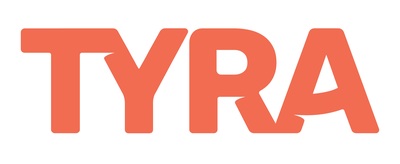Tyra Biosciences Expands Development of TYRA-300, an Oral FGFR3 Selective Agent, into Achondroplasia
Tyra Biosciences (Nasdaq: TYRA) announced the expansion of TYRA-300's development into achondroplasia following promising preclinical results. The oral FGFR3 selective inhibitor exhibited significant growth and bone length increases in preclinical models, including a 17.6% increase in body length and notable femur and tibia length improvements. A Phase 2 clinical study is planned for 2024, addressing unmet medical needs in children with achondroplasia. Additionally, TYRA has received FDA clearance for a Phase 1 study of TYRA-200, aimed at advancing its pipeline. A conference call was held on March 1 to discuss these developments.
- TYRA-300 showed a 17.6% increase in body length in preclinical models.
- Significant increases in femur (+24.4%) and tibia (+38.3%) lengths were reported.
- The FDA cleared IND for a Phase 1 study of TYRA-200, indicating progress in the pipeline.
- None.
Insights
Analyzing...
- In preclinical models, TYRA-300 demonstrated significant increases in growth and bone length-
-Phase 2 clinical study for pediatric achondroplasia planned to be initiated in 2024-
-Conference call and webcast today, March 1st, at 8:00 am ET-
CARLSBAD, Calif., March 1, 2023 /PRNewswire/ -- Tyra Biosciences, Inc. (Nasdaq: TYRA), a clinical-stage biotechnology company focused on developing next-generation precision medicines that target large opportunities in Fibroblast Growth Factor Receptors (FGFR) biology, today announced that it is expanding development of TYRA-300 into achondroplasia (ACH) based on positive preclinical results demonstrated in a study performed in collaboration with the Imagine Institute in Paris, France. Achondroplasia, the most common form of dwarfism, is a skeletal dysplasia in which growth plate cartilage is affected, resulting in decreased growth of the long bones, vertebral bodies and skull base. These growth differences result in health complications such as cranial and spinal stenosis, hydrocephalus and sleep apnea. A specific mutation in FGFR3 causes over
In the study, TYRA-300 was evaluated in FGFR3 wild-type and mutant preclinical models to measure increases in growth and bone length, compared to vehicle-treated mice. In an FGFR3 Y367C/+ model, TYRA-300 was administered daily at a 1.2 mg/kg dose for 15 days. TYRA-300 increased body length in mice by
"Our design goal for TYRA-300 was to develop a competitive FGFR3 inhibitor that overcomes the significant liabilities of approved agents, including tolerability, off-target toxicities, and acquired resistance," said Todd Harris, CEO of TYRA. "The encouraging results seen to date with TYRA-300 in key oncology and skeletal dysplasia models provide us great confidence to expand our pipeline beyond targeted oncology and pursue genetic conditions like achondroplasia."
Dr. Laurence Legeai-Mallet, who led the research, added, "We are very excited about the initial results of TYRA-300 in our skeletal dysplasia mouse model, given our deep experience with multiple clinical agents in the FGFR3 related skeletal dysplasia space. The increases in animal growth and bone length with TYRA-300 are promising. We look forward to working with TYRA on further development." Dr. Legeai-Mallet is director of research at Institut National de la Santé et de la Recherche Médicale (INSERM), and head of the Laboratory "Molecular and Physiopathological Bases of Osteochondrodysplasia" at the Imagine Institute (Paris, France).
"Children with achondroplasia often have medical complications that are not being addressed with current therapies - such as spinal stenosis, genu vara and sleep apnea - and I'm pleased that TYRA is pursuing clinical development," said Dr. Michael Bober, Medical Director of the Skeletal Dysplasia Program, Nemours Children's Hospital, Delaware. "TYRA-300 is an exciting new oral option targeting the FGFR3 pathway directly that I believe could have a life-changing impact for children with achondroplasia."
Hiroomi Tada, M.D., Ph.D., CMO of TYRA, commented, "We are working on a development plan to deliver a potentially safe and convenient oral therapy to address the unmet needs of children with achondroplasia. We look forward to submitting an IND to enable a Phase 2 study in pediatric achondroplasia in 2024."
In addition, TYRA continues to progress its pipeline and reports that the U.S. Food and Drug Administration (FDA) cleared its IND to proceed with a Phase 1 clinical study of TYRA-200, an FGFR1/2/3 inhibitor with potency against activating FGFR2 gene alterations and resistance mutations. This trial is expected to dose the first patient in the second half of 2023.
Conference Call & Webcast Information
TYRA will host a conference call and webcast today, March 1, 2023 at 8:00 a.m. ET. The conference call can be accessed by dialing 1-646-968-2525 for domestic callers and 1-888-596-4144 for international callers. Please provide the operator with the passcode 7533836 to join the conference call. The conference call will also be available via webcast under the "For Investors" section of TYRA's website at www.tyra.bio. An archive of the teleconference and webcast will also be made available on TYRA's website following the call.
About TYRA-300
TYRA-300 is the Company's lead precision medicine program stemming from its in-house SNÅP platform. TYRA-300 is an investigational, oral, FGFR3-selective inhibitor currently in development for the treatment of cancer and skeletal dysplasias including achondroplasia. TYRA-300 is being evaluated in a multi-center, open label Phase 1/2 clinical study, SURF301 (Study in Untreated and Resistant FGFR3+ Advanced Solid Tumors). SURF301 (NCT05544552) was designed to determine the optimal and maximum tolerated doses (MTD) and the recommended Phase 2 dose (RP2D) of TYRA-300, as well as to evaluate the preliminary antitumor activity of TYRA-300. SURF301 is currently enrolling adults with advanced urothelial carcinoma and other solid tumors with FGFR3 gene alterations. In skeletal dysplasias, TYRA-300 has demonstrated positive preclinical results and the Company expects to submit an IND for the initiation of a Phase 2 clinical study in pediatric achondroplasia in 2024.
About Tyra Biosciences
Tyra Biosciences, Inc. (Nasdaq: TYRA) is a clinical-stage biotechnology company focused on developing next-generation precision medicines that target large opportunities in FGFR biology. The Company's in-house precision medicine platform, SNÅP, enables the rapid and precise refinement of structural drug design through iterative molecular SNÅPshots that help predict genetic alterations most likely to cause acquired resistance to existing therapies. TYRA's initial focus is on applying its accelerated small molecule drug discovery engine to develop therapies in targeted oncology and genetically defined conditions. TYRA is based in Carlsbad, CA. For more information about our science, pipeline and people, please visit www.tyra.bio and engage with us on LinkedIn.
Forward-Looking Statements
TYRA cautions you that statements contained in this press release regarding matters that are not historical facts are forward-looking statements. The forward-looking statements are based on our current beliefs and expectations and include, but are not limited to: the potential to develop next-generation precision medicines and the potential safety and therapeutic benefits of TYRA-300; and the expected timing and phase of clinical development of TYRA-300 in pediatric achondroplasia and TYRA-200. Actual results may differ from those set forth in this press release due to the risks and uncertainties inherent in our business, including, without limitation: we are early in our development efforts, have only recently begun testing our lead product candidate in clinical trials and the approach we are taking to discover and develop drugs based on our SNÅP platform is novel and unproven and it may never lead to product candidates that are successful in clinical development or approved products of commercial value; potential delays in the commencement, enrollment, and completion of preclinical studies and clinical trials; results from preclinical studies or early clinical trials not necessarily being predictive of future results; our dependence on third parties in connection with manufacturing, research and preclinical testing; acceptance by the FDA of INDs or of similar regulatory submissions by comparable foreign regulatory authorities for the conduct of clinical trials of TYRA-300 in pediatric achondroplasia; an accelerated development or approval pathway may not be available for TYRA-300 or other product candidates and any such pathway may not lead to a faster development process; unexpected adverse side effects or inadequate efficacy of our product candidates that may limit their development, regulatory approval, and/or commercialization; the potential for our programs and prospects to be negatively impacted by developments relating to our competitors, including the results of studies or regulatory determinations relating to our competitors; our ability to maintain undisrupted business operations due to the COVID-19 pandemic or other epidemic diseases, including delaying or disrupting our preclinical studies and clinical trials, manufacturing, and supply chain; regulatory developments in the United States and foreign countries; and other risks described in our prior filings with the Securities and Exchange Commission (SEC), including under the heading "Risk Factors" in our annual report on Form 10-K and any subsequent filings with the SEC. You are cautioned not to place undue reliance on these forward-looking statements, which speak only as of the date hereof, and we undertake no obligation to update such statements to reflect events that occur or circumstances that exist after the date hereof. All forward-looking statements are qualified in their entirety by this cautionary statement, which is made under the safe harbor provisions of the Private Securities Litigation Reform Act of 1995.
Contact:
Amy Conrad
aconrad@tyra.bio
![]() View original content to download multimedia:https://www.prnewswire.com/news-releases/tyra-biosciences-expands-development-of-tyra-300-an-oral-fgfr3-selective-agent-into-achondroplasia-301759074.html
View original content to download multimedia:https://www.prnewswire.com/news-releases/tyra-biosciences-expands-development-of-tyra-300-an-oral-fgfr3-selective-agent-into-achondroplasia-301759074.html
SOURCE Tyra Biosciences








